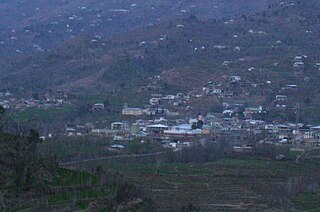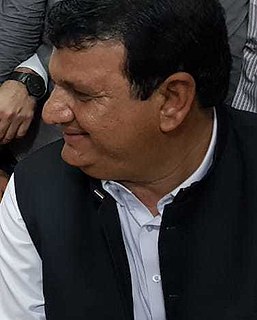Related Research Articles
Augustus Frederic Rudolf Hoernlé CIE, also referred to as Rudolf Hoernle or A. F. Rudolf Hoernle, was a German Indologist and philologist. He is famous for his studies on the Bower Manuscript (1891), Weber Manuscript (1893) and other discoveries in northwestern China and Central Asia particularly in collaboration with Aurel Stein. Born in India to a Protestant missionary family from Germany, he completed his education in Switzerland, and studied Sanskrit in the United Kingdom. He returned to India, taught at leading universities there, and in the early 1890s published a series of seminal papers on ancient manuscripts, writing scripts and cultural exchange between India, China and Central Asia. His collection after 1895 became a victim of forgery by Islam Akhun and colleagues in Central Asia, a forgery revealed to him in 1899. He retired from the Indian office in 1899 and settled in Oxford, where he continued to work through the 1910s on archaeological discoveries in Central Asia and India. This is now referred to as the "Hoernle collection" at the British Library.

Islam Akhun was an Uyghur con-man from Khotan who forged numerous manuscripts and printed documents and sold them as ancient Silk Road manuscripts. Since the accidental discovery of the Bower Manuscript in 1889 such texts had become much sought after. The imperial powers of the time sponsored archaeological expeditions to Central Asia, including Britain, France, Germany, Russia and Japan.
A Muqam is the melody type used in the music of the Uyghurs, that is, a musical mode and set of melodic formulas used to guide improvisation and composition.

There is much variation in the music of Xinjiang, including unique regional differences in Ili, Kashgar, Hotan and Aksu Prefecture. The southern area includes the simple songs of Hotan, the dance-oriented music of the Kuqa and the complexly rhythmic songs of the Kashgar. Ili has perhaps the most well-known musical tradition in Xinjiang, including a number of emotional tunes that are narrative in form.
Abdurashid Khan (1508-1560) was the ruler of the Yarkent Khanate in modern-day Yarkant County, Xinjiang between 1533 and 1560.

Puran is a sub-division and tehsil of Shangla District in Khyber-Pakhtunkhwa province of Pakistan. The subdivision includes three tehsils viz: Puran itself, Martung and Makhuzai. Puran Sub-division comprises nine Union Councils.

Kabal is a town in Swat District, Khyber-Pakhtunkhwa province of Pakistan located 10 kilometres (6 mi) from Mingora city. The old name of kabal was Chendakhwara. It is the tenth largest city in Khyber Pakhtunkhwa and 82nd largest in Pakistan by population.
Axundlu is a village and municipality in the Agsu Rayon of Azerbaijan. It has a population of 197.
Dolan refers to a people or region of what is now Xinjiang Province, China. People who call themselves Dolan can be found in Awat County, the Yarkand River valley, the Tarim River valley and the Lop Nur region of present-day Xinjiang. Though modern Dolan people now speak the vernacular dialect, the term refers to an earlier culture and civilization in the region. The history of this people is little known. Some scholars and travelers believed the Dolan of the Yarkand River valley to be a Kazakh or Kyrgyz group that settled in the area during the Qing dynasty. This belief was based on their noticeably different physiognomy and language and their semi-nomadic lifestyles.
A meshrep is a traditional male Uyghur gathering that typically includes "poetry, music, dance, and conversation within a structural context". Meshreps typically include music of the muqam variety and ad-hoc tribunals on moral questions.
Turdi Akhun, sometimes spelled Turdu Ahun, was a traditional Uyghur folk musician in the Xinjiang region. He was born into a family with a rich musical history and could perform his music completely from memory, even into his 70s. Prior to his death he, along with Omar Akhun, made a recording of 12 muqams and was recognised as the foremost exponent of this genre.

Amir Muqam Khan is a Pakistani politician, national conservative, and mechanical engineer who was Advisor to Prime Minister on federal departments in Khyber Pakhtunkhwa since 29 October 2013.
Bandar-e Moqam is a village in Moqam Rural District, Shibkaveh District, Bandar Lengeh County, Hormozgan Province, Iran. At the 2006 census, its population was 1,537, in 296 families.
Mal-e Akhund is a village in Tayebi-ye Garmsiri-ye Shomali Rural District, in the Central District of Landeh County, Kohgiluyeh and Boyer-Ahmad Province, Iran. At the 2006 census, its population was 55, in 11 families.
Akhun is a Uyghur surname. Notable people with the surname include:

Mount Akhun (Ахун) is a stand-alone mountain in the Khostinsky City District of Sochi, Russia. Wedged between the Matsesta and Khosta rivers, this karst massif is the highest point of the Sochi littoral.
KHAKHOO Harrori includes three revenue estates in Mansehra district, Khyber Pakhtunkhwa (KPK) province, Pakistan. It is inhabited (mostly) by a single tribe and is governed by its own village council.
Akhun is a rural locality in Kuzeyevsky Selsoviet, Buzdyaksky District, Bashkortostan, Russia. The population was 387 as of 2010. There are 5 streets.
Kuzeyevo is a rural locality and the administrative centre of Kuzeyevsky Selsoviet, Buzdyaksky District, Bashkortostan, Russia. The population was 492 as of 2010. There are 6 streets.
Usmanovsky is a rural locality in Kuzeyevsky Selsoviet, Buzdyaksky District, Bashkortostan, Russia. The population was 103 as of 2010. There is 1 street.
References
- ↑ "Cultural Politics and the Pragmatics of Resistance". Archived from the original on 2009-07-15. Retrieved 2017-09-10.
- ↑ Northern Iraq info